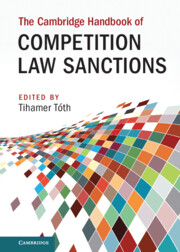Book contents
- The Cambridge Handbook of Competition Law Sanctions
- The Cambridge Handbook of Competition Law Sanctions
- Copyright page
- Contents
- Authors’ Affiliations
- Acknowledgment
- Part I General Chapters
- 1 The Quest to Create an Effective Set of Competition Law Sanctions
- 2 The Role of Fines in the Toolkit of Competition Agencies
- 3 Sanctions on Legal Persons
- 4 The Effectiveness of European Antitrust Fines
- 5 Corporate Governance and Competition Law Sanctions
- 6 Antitrust Criminalization As a Legitimate Deterrent
- 7 Criminalization of Anticompetitive Conducts
- 8 “Consensus”-Based Sanctions and Commitments
- 9 Effectiveness of Commitment Decisions
- 10 Compliance Policies and Sanctions
- 11 The Role of Administrative Courts in the Effective Enforcement of Competition Law Sanctions
- 12 Civil Sanctions in Antitrust Public Enforcement
- 13 What Role for Private Enforcement in EU Competition Law?
- 14 The Insights of Labor Law
- 15 Human Rights Jurisprudence and the Effectiveness of Competition Law Sanction
- 16 Catholic Teaching on Just Punishment, Especially in Connection with Financial Matters: According to the 1983 Code of Canon Law
- Part II Country Reports
11 - The Role of Administrative Courts in the Effective Enforcement of Competition Law Sanctions
from Part I - General Chapters
Published online by Cambridge University Press: 29 July 2022
- The Cambridge Handbook of Competition Law Sanctions
- The Cambridge Handbook of Competition Law Sanctions
- Copyright page
- Contents
- Authors’ Affiliations
- Acknowledgment
- Part I General Chapters
- 1 The Quest to Create an Effective Set of Competition Law Sanctions
- 2 The Role of Fines in the Toolkit of Competition Agencies
- 3 Sanctions on Legal Persons
- 4 The Effectiveness of European Antitrust Fines
- 5 Corporate Governance and Competition Law Sanctions
- 6 Antitrust Criminalization As a Legitimate Deterrent
- 7 Criminalization of Anticompetitive Conducts
- 8 “Consensus”-Based Sanctions and Commitments
- 9 Effectiveness of Commitment Decisions
- 10 Compliance Policies and Sanctions
- 11 The Role of Administrative Courts in the Effective Enforcement of Competition Law Sanctions
- 12 Civil Sanctions in Antitrust Public Enforcement
- 13 What Role for Private Enforcement in EU Competition Law?
- 14 The Insights of Labor Law
- 15 Human Rights Jurisprudence and the Effectiveness of Competition Law Sanction
- 16 Catholic Teaching on Just Punishment, Especially in Connection with Financial Matters: According to the 1983 Code of Canon Law
- Part II Country Reports
Summary
Andras Gyorgy Kovács researched the effectiveness of competition sanctions from the perspective of an administrative judge. Undertakings in breach of competition law rules are most likely expected to be fined. His hypothesis, ,to be examined through the courts’ case law, is that the level of competition fines is significantly higher than that of criminal penalties. Nevertheless, it is not unusual for the very same undertaking to be reinvestigated by the competition authority for a second or even third time. It seems that the expected legal policy aim of fines in competition matters, i.e. the individual and general prevention of anticompetitive practices, cannot be achieved in all cases. His chapter aims at identifying the reasons thereof and presenting a number of conclusions, to be drawn from the Hungarian administrative courts’ jurisprudence, in respect of the effectiveness of the imposition of fines. He argues that judicial case law can resolve some of the efficiency problems, while others require modification of the legislation. As regards repeated infringements, evaluating this as an aggravating factor may be used in an effective and reassuring way when imposing a fine. He argues for laws which stipulate the imposition of fines proportionate to the infringing undertakings’ income and assets.
Keywords
- Type
- Chapter
- Information
- The Cambridge Handbook of Competition Law Sanctions , pp. 193 - 204Publisher: Cambridge University PressPrint publication year: 2022



